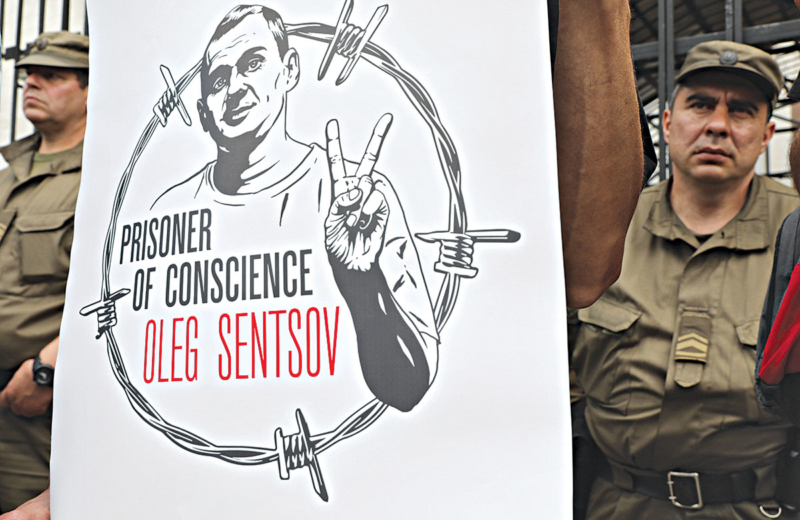Ukrainian filmmaker Oleg Sentsov, sentenced to 20 years in Russian prison after a sham trial by a Kremlin-controlled court, is now in critical condition, his cousin, Nataliya Kaplan, wrote on Facebook on Aug. 8.
Sentsov is 89 days into a hunger strike, which he started to draw the world’s attention to the 70 Ukrainian political prisoners kept in Russian jails. He told his cousin in a letter she received on Aug. 8 that the end of his life is near.
The Kremlin is giving signals that it will let its hostage die in prison as a lesson to other political prisoners. Russia jailed Sentsov after he vocally protested against the Kremlin’s military invasion and occupation of the Crimean peninsula in 2014.
Russia’s Federal Penitentiary Service stated that Sentsov’s health is in satisfactory condition in a press release, published late on Aug. 8. But Dmitriy Dzindze, Sentsov’s lawyer. disputed this assessment in an interview with the Kyiv Post on Aug. 9.
Dzindze has been visiting the Ukrainian director every two weeks in a prison hospital in the Siberian town of Labytangi, more than 5,000 kilometers from his native Crimea, since he started his hunger strike in May.
“He looks bad; his heart rate now is 40 beats a minute. He has anemia, heart, kidney and liver problems. He doesn’t get up anymore. Lies in bed most of the time,” Dzindze said, describing his clients’ condition.
And Kaplan, in her post, confirmed that “everything is catastrophically bad. He hardly can get up from bed.”
While Russia’s Federal Penitentiary Service forbids taking any pictures of Sentsov, Ukrainian human rights ombudswoman Lyudmila Denisova posted on Facebook on Aug. 9 photographs purportedly of Sentsov, date stamped as having been taken at 16:49 Kyiv time on Aug. 9. The photos show Sentsov looking drawn, but standing unaided.
However, it is impossible to verify if the pictures were indeed taken at the time indicated. Denisova said her Russian counterpart sent her the pictures.
According to Dzindze, the filmmaker is being kept alive by intravenous drips of glucose and nutrients.
Dzindze said that, according to information from diplomatic sources, the Kremlin is not going to release Sentsov and “would rather let him die as a lesson for other political prisoners of Russia’s dictatorship.”
Denisova wrote on Facebook on Aug. 8 she was ready to go to Russia and demand Sentsov’s release.
“I am ready to take the plane and fly there immediately,” Denisova wrote in a public address to Russian ombudswoman Tetiana Moskalkova, adding that Sentsov must be flown to a proper hosptial for immediate medical help.
However, the Russian ombudsman is currently on summer vacation, according to her spokesperson.
European Union leaders, politicians, and celebrities around the globe have long been calling on the Kremlin to free Sentsov. The movie director was arrested in Crimea by Russian forces in 2014, soon after the Kremlin invaded the peninsula and started its occupation of the Ukrainian territory.
Kremlin’s prisoner
In August 2015, after a year-long sham trial, Sentsov was sentenced to 20 years in Russian prison for allegedly “organizing a terrorist group and plotting attacks.”
The two key witnesses in the trial later said they had given their evidence against Sentsov under duress.
Russia has ignored all calls to release the jailed Ukrainian. It has several times transferred Sentsov to different prisons and tried to force him to stop his hunger strike. It has also denied permission for Denisova to visit Sentsov in prison in the Siberian town of Labytangi, more than 5,000 kilometers away from his native Crimea.
Sentsov started his hunger strike on May 14, a month before the start of the World Cup football championships in Russia.
Although human rights watchdogs and Russian authorities have tried to persuade him to stop his hunger strike, Sentsov has refused to do so.
“If I die before or during the World Cup in Russia, it will create a resonance in favor of other political prisoners,” Sentsov told Dinze in June.
The European Court of Human Rights has insisted that Sentsov must be transferred to a civilian hospital closer to Crimea. But Sentsov has refused.
“He said he wouldn’t survive the journey,” Kaplan said.
Sentsov also opposes being transferred to the civilian hospital in Labytangi, as “the staff there is aggressive towards him and can do only harm,” Kaplan said.
Denied information
Kaplan also said Sentsov was asking whether anyone is still paying attention to his hunger strike, as the Russians haven’t passed any letters from Ukraine to him.
“Oleg says he is in the information vacuum right now and has no clue what’s happening,” Kaplan said.
Dzidze told the Kyiv Post that Sentsov hasn’t got any letters from Ukraine for more than two weeks alr eady because his “prison censor” was also on summer vacation.
However, his lawyer said, Sentsov’s mind remains strong. The director is ready to die for justice, Dzindze told the Crimean News Agency on Aug. 7.
Sentsov, however, still hopes to return to Ukraine and continue making films.



